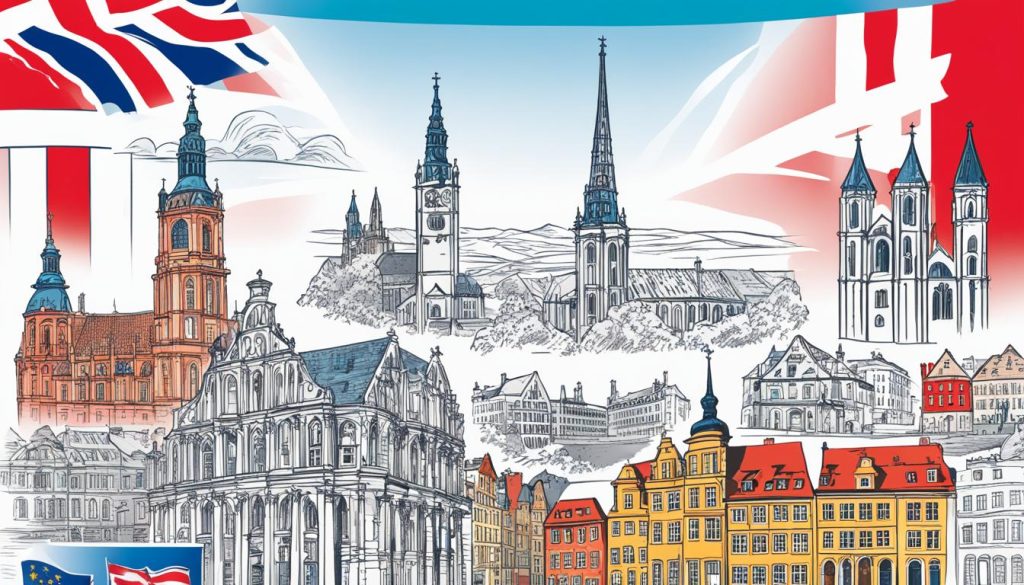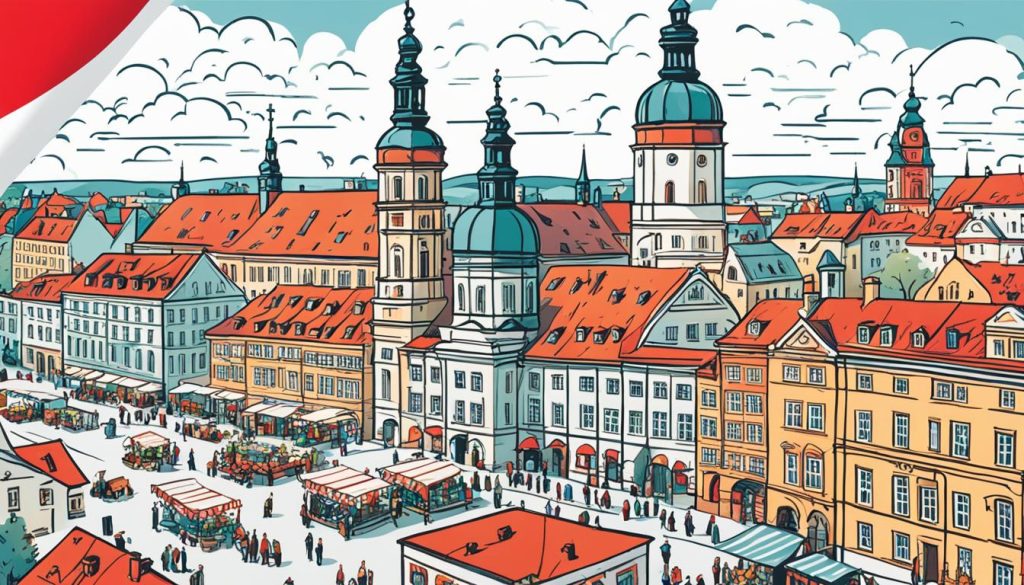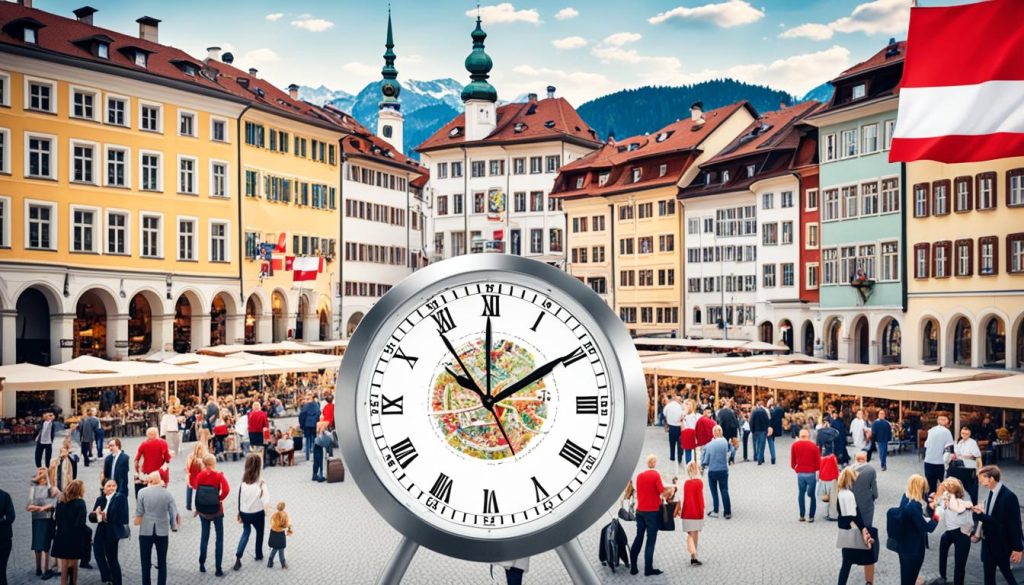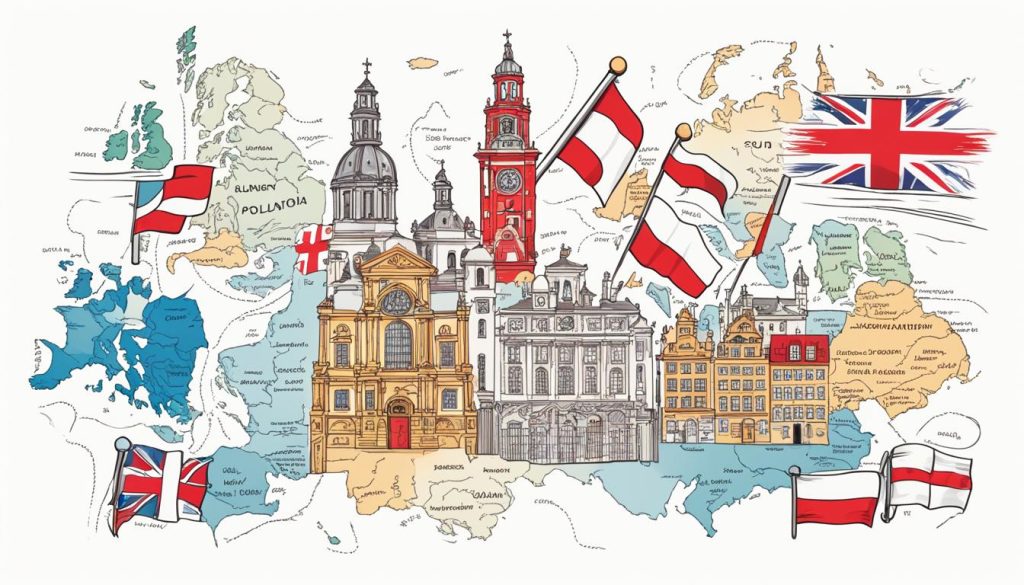Exploring global trade gives us insight into different business practices and cultural comparisons. The United Kingdom, Austria, and Poland are particularly interesting. They show us how corporate responsibility, social values, and lifestyle balance impact business. They aim for economic sustainability in the competitive European labour market.
Introduction to Business and Culture in Europe

The European business landscape is rich and varied. It’s shaped by different cultures and market economies. Understanding this diversity is key to getting the full picture.
In Europe, there’s a big focus on balancing work and personal life. This balance is measured by things like the Life-Work Balance Index. The Business Culture Complexity Index also helps us understand the challenges of working across cultures.
- Assessing the mosaic of Europe’s business practices through the prism of Cultural diversity.
- Evaluating the robustness of individual market economies, guided by nation-specific economic indicators.
- Deciphering the data from the Business Culture Complexity Index to gauge the intricacy of corporate interactions.
- Considering the Life-Work Balance Index to appreciate the qualitative aspects of the European professional experience.
These factors together show Europe as a place where business success and cultural values go hand in hand. This blend highlights Europe’s dedication to keeping work and life in harmony.
An Overview of United Kingdom’s Business Environment

The UK economy intricately balances strong economic performance with the upkeep of its social and environmental responsibilities. This balance reflects a modern society that is careful about sustainability, creating a business environment that is both efficient and aware.
The Doughnut Model of Economy in the UK
The Doughnut Model is a pioneering framework for balancing human activity with the natural world. It places UK business at the heart of innovation and sustainability. The model consists of two rings: the social foundation, which meets basic human needs, and the ecological ceiling, which marks our planet’s limits.
In the UK, policies and economic actions are judged by their impact on social equity and the environment. Emphasis is on enduring economic strategies that support a thriving society within our planet’s limits, not just GDP growth.
Assessing Business Culture Complexity in the UK
The UK’s emphasis on sustainability matches its business practices well, as seen in the Business Culture Complexity Index™. With a score of 26,720, the UK’s business culture is moderately complex. It’s a culture where clarity and accessibility are evident in business dealings.
- The nation benefits from high scores in Doing Business and Economic Freedom, indicating a market that values transparency and supports entrepreneurs.
- Press Freedom is key to this transparency. It ensures free information flow, building trust among investors and the public.
- A less hierarchical business structure in the UK encourages an informal, dynamic commerce network. It promotes innovation and collaboration across sectors.
Overall, the UK is on a journey where economic goals align more and more with social and environmental aims. This approach aims for commercial success that benefits society as a whole.
A Closer Look at Austrian Commercial Practices

The Austrian business scene combines a rich history with modern innovation. It’s known for being stable and competitive in Europe. This balance reflects Austria’s appreciation of its traditions and a drive towards future achievements.
In Austria, there’s a blend of efficient work and a good life quality. This shows the commitment to a business culture that values growth and sustainability. Austrian companies focus on careful planning and precision. These qualities are seen in many sectors, from making things to providing services.
- Conservative Financial Approaches: A characteristic feature of Austrian commercial practices is a conservative approach to financing and investment, favouring steady growth over risky ventures.
- Rigorous Legal Frameworks: Businesses operate within comprehensive legal frameworks, which, while ensuring a high degree of regulatory compliance, may require in-depth local knowledge to navigate effectively.
- Consensus-Driven Decision Making: Austrian business culture often embodies a participative style of management, where consensus and collective agreement are favoured over unilateral decision-making.
- Long-Term Business Relationships: There’s a preference for building long-lasting business associations, which speaks to the importance of trust and personal connections in Austrian commerce.
The Business Culture Complexity Index™ measures Austria’s moderate openness to business. It scores 25,982. This score indicates that while Austrian business practices have intricacies, they can be navigated successfully. Knowing the local business culture is key for investors and international partners.
To do well in Austria, understanding its business environment is crucial. Respect for formal business processes and the cultural nuances will help anyone succeed. Aligning with Austria’s commercial habits is essential for thriving in its economy.
Poland’s Approach to Business and Economics

Exploring Poland’s business culture reveals a mix of old traditions and modern agility. Within the competitive scene of the European market, Poland shows its distinct style. It combines cultural depth with evolving economic actions. The Polish economy is filled with growth signs, showing both hurdles and the remarkable resilience of this strong market player.
Business Culture Complexity in Poland
The Business Culture Complexity Index™ ranks Poland notably high. This points to barriers for entering the market due to unique cultural aspects. The rank means Poland’s business scene is complex yet filled with potential for new businesses. The economy is a proof of Poland’s toughness in facing economic trials. It offers rewards for those who adapt well to its culture.
Poland’s Standing in the European Economic Landscape
Poland’s economic story is one of constant growth and adjustment. It enjoys a strong spot in the European market, boasting signs of continuous progress and dedication to development. Being an active force in Europe, Poland is on a dynamic path. The country has made huge leaps in recent decades. Now, it presents a growing economy full of chances for smart international businesses.
- Poland’s labyrinthine business culture demands nuanced strategies for successful market penetration.
- Economic indicators favour those who appreciate and leverage Poland’s unique cultural dimensions.
- Tapping into the Polish economy requires a deft approach to overcoming market entry barriers.
Poland’s place in the European market calls for detailed exploration and involvement from worldwide businesses. Grasping the diverse cultural mosaic of Poland is key. This understanding helps in overcoming economic challenges and seizing the many opportunities within this lively economic scene.
Comparing Entrepreneurial Climate Among the Three Nations

Entrepreneurial environments are crucial for economic growth. They’re influenced by factors ranging from laws to cultural practices. The UK, Austria, and Poland offer unique opportunities and hurdles for businesses and start-ups.
The UK shines in its vibrant start-up culture. It boasts numerous tech startups and creative businesses. The government provides tax breaks and support programs to boost entrepreneurship. Austria, with its stable business scene and key European location, aids companies in trading across borders. Yet, it tends to be more conservative towards taking business risks.
Poland is witnessing rapid development in its entrepreneurial sector. A large number of young, educated people are keen to start their ventures. Investments in tech are on the rise, making Poland’s start-up scene flourish despite economic obstacles.
- United Kingdom: A global hub for tech start-ups and a magnet for investors.
- Austria: Offers a balanced business environment with strong connections within the EU.
- Poland: Rapidly growing start-up ecosystem with ample room for development.
The UK, Austria, and Poland showcase the varied entrepreneurial climates in Europe. These nations highlight differences in economic strategies, business conditions, and innovation. This underlines the rich diversity in European commercial customs and entrepreneurial approaches.
Understanding the Cultural Dimensions of United Kingdom

To understand the UK’s culture, we see how work and personal life blend. This balance shows the nation’s social values. The laws around work time and holidays support this, making sure people can rest.
Work-Life Balance in the UK
In the UK, work-life balance matters for health and productivity. The country offers good holiday time for relaxation. This helps workers stay healthy and manage their personal lives.
- Annual leave: Workers are entitled to 5.6 weeks paid holiday per year, a well-being measure that showcases the UK’s commitment to rest and recreation.
- Family leave: Provisions for maternity, paternity, and parental leave manifest the cultural value placed on family and personal responsibilities.
- Flexible working: Employment laws have adapted to changing cultural norms, permitting more flexibility in working hours and locations, fostering a better balance between personal commitments and professional duties.
Social Values and Business Etiquette
British social values shine in their business etiquette. It balances formality with personal touches, fostering respect and friendliness.
- Formal Meetings: While a certain level of formality frames these interactions, there’s also a British penchant for subtle humour and light-hearted banter, making business dealings less rigid.
- Networking: The British emphasis on relationship-building over transactional interactions reveals a preference for longevity and trust in professional relationships.
- Communication: Direct yet polite communication is the benchmark of business etiquette in the UK, reflecting the cultural norms of clear and respectful discourse.
By caring for mental health and promoting growth, the UK brings its business practices in line with its social values. This makes the work environment better for everyone.
Cultural Insights into Austrian Society

Austrian culture is at the core of Central Europe. It shows how society’s values blend with work life. It has traditions and modernity, giving a special view on norms seen in business and work traditions. This gives us a clear picture of Austrian society and how it affects business.
Formality is key in Austria’s business world. There is a deep respect for hierarchy and how we talk to each other. This respect makes sure all professional talks are polite and show Austrian culture.
- Adherence to strict appointment schedules, displaying punctuality as a sign of respect.
- Use of formal titles and last names, unless otherwise invited to use first names.
- A preference for face-to-face meetings as opposed to virtual correspondence.
In Austria, social norms have a big impact on business. There’s a focus on togetherness and social peace at work. Everyone is pushed to work as a team. This creates an environment where everyone makes decisions together.
- Implementation of the ‘Social Partnership’ reflecting collaboration between employers and employees.
- Regard for the work-life balance through the observance of public holidays and generous vacation time.
- Heavy investment in apprenticeships and vocational training within companies.
Coffee houses and boardrooms are key places in Austria. They show how culture and work traditions are connected. This culture reaches beyond work, making a business world that’s different and ready for change.
Exploring Polish Traditions and Business Etiquette

In the heart of Central Europe, Polish business customs blend with the nation’s history and growing economy. These traditions show a deep group ethos, showing how well Polish firms build team spirit. This unity is seen across all parts of society.
Poland’s Emphasis on Group Orientation in Business
Polish companies greatly value team work. This is key to their success. It shows in every aspect of their business life. Teamwork and solidarity are vital, with everyone aiming for common goals. Polish companies focus on working together rather than individual wins. They also stress ethics and shared responsibility in their decisions and solving problems.
The Impact of Cultural Values on Polish Business Practices
Poland’s business scene is steeped in ethics and culture. These values guide how business is done at all levels. They honour the chain of command but also cherish teamwork. This balance helps order and working together. It’s vital for leading teams, negotiating, and keeping up ethics. It also helps the community stick together.
- Importance of teamwork and shared goals amidst Polish team dynamics
- Social cohesion bred by collective initiatives and commercial ventures
- Ethical commercial conduct as a reflection of deeply rooted societal values
Promoting traditions in business, Poland shows the power of unity and ethics. Merging these with modern ways, Poland stands out in Europe and the world. This mix of old and new makes Poland’s business culture unique and strong.
Comparing Business and Culture Between United Kingdom, Austria and Poland

The United Kingdom, Austria, and Poland show varied business scenes. They reflect their rich cultures. Exploring these differences offers insights into Europe’s diverse business practices.
In the UK, business is fast-paced, tapping global markets. Austria connects East and West with stability, while Poland is fast emerging in Europe. Each has its strengths, from international finance in London to new opportunities in Poland.
- Fusion of historic traditions with modern entrepreneurial spirit
- Emphasis on ethical trading and corporate responsibility
- Flexibility and adaptability in business interactions
- A balanced mix of formalism with personal touch in commerce
- Long-standing values meeting modern efficiency standards
- Emphasis on craftsmanship and quality within the European market
- The rise of a youthful, tech-savvy entrepreneurial community
- Collectivist culture reflected in team-oriented commercial endeavours
- Incorporating traditional values in modern business practices
The UK is known for innovation and attracts global investors. Austria focuses on quality and tradition. Poland enjoys a growing, tech-led market.
Grasping these differences helps investors and enriches the business scene. It’s about understanding each nation’s business soul, influencing Europe’s economic environment.
Examining Life-Work Balance: UK, Austria, and Poland
The quest for a good life-work balance is common across Europe. Policies on leave and equality are key. Estonia is a great example of how leave policies help people’s well-being.
Estonia as a Case Study for Leave Policies
Estonia leads in creating policies for a better life-work balance. It offers great maternity benefits and long parental leave. These help parents immensely, showing Europe’s dedication to a thriving society.
LGBTQ+ Inclusivity and Social Policies in the UK, Austria, and Poland
The UK, Austria, and Poland each have their approach to equality, focusing on LGBTQ+ inclusion. They value diversity at work. This helps build a culture where everyone’s personal and work lives are respected. Anti-discrimination laws and equal opportunities are key in these countries, ensuring everyone feels valued.
- Life-work balance in Estonia: A benchmark for leave policies in Europe.
- Maternity perks: Contributing to enhanced European life quality.
- Diversity in the workplace: Central to European inclusion strategies.
- LGBTQ+ inclusivity: A touchstone of social equality policies across Europe.
In conclusion, Estonia’s strong leave policies are a model for others. Meanwhile, the UK, Austria, and Poland are improving their strategies. They aim for a life-work balance achievable for all.
Sustainability and Corporate Responsibility Across Three Regions
In the UK, Austria, and Poland, businesses now put a strong focus on environmental stewardship. They are shaping their strategies to lessen their environmental impacts. This shows how important it is for companies to protect our planet and improve society’s well-being.
The idea of corporate governance in these areas has changed to include being accountable and ethical. Companies are not just answering to their shareholders anymore. They also consider others affected by their environmental and social actions. This is proof of their dedication to being socially responsible.
- UK firms are using green technology and cutting down emissions to promote sustainability.
- Austrian companies are turning to renewable energy, showing their commitment to connecting industry and nature.
- In Poland, businesses focus on engaging with communities to meet sustainability goals both locally and globally.
True social responsibility means helping communities grow in a way that includes everyone. Companies should not just exist in society but should also help it flourish. By embedding sustainability into their operations, these countries are leaders in eco-friendly business actions.
For businesses to fully commit to environmental stewardship and social responsibility, they’re starting to invest in sustainable start-ups and partner with environmental nonprofits. This shows companies can be profitable and still look after our planet and its people.
The proactive approach to corporate governance in the UK, Austria, and Poland is creating a bright future. Here, economic growth and sustainability go hand in hand. It proves that companies can drive economic success and also care for the environment and future generations.
Technological Advancements and Their Impact on Business Cultures
Technologies are reshaping business globally. Digital economy growth pushes companies to update their strategies. This keeps them competitive. The UK, Austria, and Poland show how business cultures change due to this.
Internet Penetration and Its Correlation with Human Development
Internet use marks a society’s growth today. Strong tech foundations support this change and link to development. High internet access countries lead in using tech to innovate and grow.
Digitalisation in the UK, Austria, and Poland
The UK, Austria, and Poland are making digital progress a key goal. They aim to use the internet to boost their digital economies. Each shows different ways and levels of using technology.
- The UK’s tech sector is thriving, sparking innovation and new business types. This gives it an edge in Europe’s technology race.
- Austria mixes new technology with classical industries, boosting its economy. This shows tradition and innovation can work together.
- Poland uses digital tech to update industry and public services. This improves its development and business strategies.
As they embrace technological changes, their online strategies also evolve. This ensures they lead, not just join, the digital era. The UK, Austria, and Poland are navigating towards a high-tech future.
Navigating Legal and Economic Frameworks: A Comparative Review
The UK, Austria, and Poland have unique legal systems. These systems shape their business scenes deeply. Each country’s economic framework affects company strategies and market success. Their regulations reflect their history and politics.
In the UK, the common law system offers flexibility in business. This system’s stability and clear rules attract investors. They feel confident, encouraging business growth.
In contrast, Austria’s civil law presents challenges and chances. Its economic framework demands strict compliance while promoting innovation. This helps firms compete effectively.
Poland’s legal system blends civil law with new market reforms since leaving communism. Businesses there must be agile and informed. This is necessary to navigate Polish trade and commerce.
- Intersections of UK’s common law with international trade laws and practices.
- Integration of EU directives into Austrian civil law and their impact on cross-border trade.
- How Poland’s economic changes align with global trade laws and market opening.
The UK, Austria, and Poland have their own legal principles and economic frameworks. Yet, they’re also influenced by EU’s international trade laws. Companies working across borders in these countries need deep understanding. They must grasp both local and international laws to succeed in these markets.
Evaluating the Role of Trust and Happiness in Business Success
Exploring successful companies shows us that trust is crucial. It’s more than just a social tool; it’s key to lasting success. Trust and happiness together play a big part in achieving financial success. They show how culture affects business performance clearly.
Understanding these links needs looking at culture and ethics from many angles.
Assessing Corruption and its Inverse Relation with Prosperity
Corruption weakens the economy, creating a shaky base instead of prosperity. Closer look shows less corruption means more success. Integrity leads to a place where success and innovation grow.
Cultural Influence: From Religiosity to Group Orientation
Culture plays a big role in shaping businesses. Religiosity goes beyond worship places and affects how companies think. Group behavior, common in religious places, leads to collaboration and shared duty.
Community efforts drive societies and businesses to thrive together. Teamwork in business is a strong factor for success and happiness.
- Trust in Business: A heavenly currency in the marketplace of earthly affairs.
- Business Integrity: The bedrock upon which sustainable prosperity is built.
- Cultural Determinants: The subtle yet significant shapers of corporate identity.
- Religiosity Impacts: A testament to the power of shared beliefs in fortifying communal ventures.
This journey shows that business integrity and human values are essential. They are not extras but key for success and happiness in business.
Conclusion
Our comparative analysis shows how cultural intelligence, business strategies, and economic resilience interact in the UK, Austria, and Poland. Each country has its way of combining culture and economics to boost its business scene. This blend of knowing cultural details and smart economic actions leads to lasting success.
In today’s world full of challenges and chances, using cultural intelligence is key for global business. Mixing cultural understanding with smart market tactics makes economies stronger. This helps businesses in these countries do well, even when faced with tough competition and changing markets.
As we look ahead, the growth of the UK, Austria, and Poland will depend on how they adapt and stay open to new influences. Businesses need to be flexible, keep innovating, and deeply connect with different cultures. This will help them stay important and grow in Europe’s changing economy.







